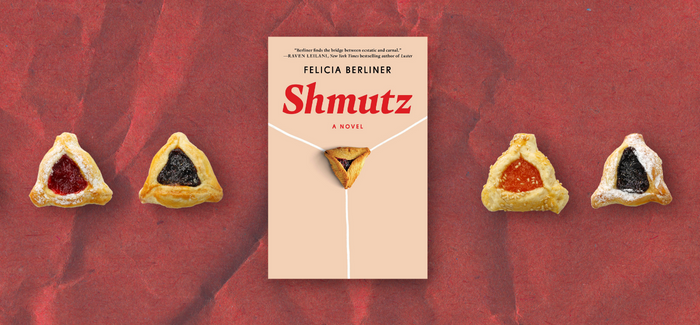Books
Fiction
Addicted to Forbidden ‘Shmutz’
Shmutz
By Felicia Berliner (Atria Books)
Felicia Berliner’s debut novel isn’t for everyone—a fact made clear from the cover image, a raspberry hamantaschen set between lines that suggest a pair of legs. Peppered with Yiddish, with sometimes stilted writing, the novel tells the story of Raizl, an ultra-Orthodox 18-year-old living with her parents and siblings in Brooklyn and working part-time as a bookkeeper who goes on arranged dates to find a husband. She is also in college—which flies in the face of her Hasidic community’s norms—after receiving a scholarship to finish an accounting degree. Her father has allowed her enrollment on the condition that she help support her family financially.
The scholarship provides her with a laptop with internet access—another violation of her community’s strict laws—that she initially uses for her work and studies. But she finds herself becoming addicted to online pornography—the titular “shmutz”—watching video after video under the covers of her bed after her sister Gitti, who shares a room with her, falls asleep. The videos entrance her, and she sees them as entrees into a new and fascinating world.
Disturbed by her fascination (“Raizl, daughter of Israel. Porn addict,” she calls herself) and fearful that she will not make a good wife, she tells both her mother and the local matchmaker that she wants no more set-ups because she’s afraid of sex. They send her to a therapist.
Wary and resentful, Raizl only shares bits and pieces of her life with the therapist. “Had sex always been behind everything, and she just hadn’t seen it?” Raizl wonders to herself. “The way people who aren’t religious don’t see the G-d in everything. The way for some people an apple is just an apple, a subway pole just a thing to grab when the brakes screech.”
As her consumption of porn increases, Raizl breaks other rules: She hangs out with non-Jewish students, eats a non-kosher egg roll bought from a street vendor, wears pants and a low-cut shirt. The guilt and shame she experiences with each transgression compete with her curiosity and the thrill of the forbidden. This is the central struggle Raizl faces: Will she be able to denounce these temptations, meet a husband and remain a part of the Hasidic community that she loves and values?
In this coming-of-age story, Raizl’s voice is one that most women will recognize: the struggle to have one’s needs fulfilled and be able to express oneself while trying to live up to societal norms and expectations. Indeed, Raizl doesn’t want to reject her upbringing or community.
Berliner has written a humorous, thought-provoking and unique book about Judaism, Orthodoxy, human urges and addiction. She avoids stereotypes, which makes Shmutz a welcome alternative to stories of rebellion and leaving the Orthodox fold. Instead, it’s a nuanced and tension-filled story about the competing appeals of religious and secular life.
Jaime Herndon is a writer and avid reader. Her work can be found on Book Riot, Undark, Kveller, Motherly and other places.










 Facebook
Facebook Instagram
Instagram Twitter
Twitter
Leave a Reply